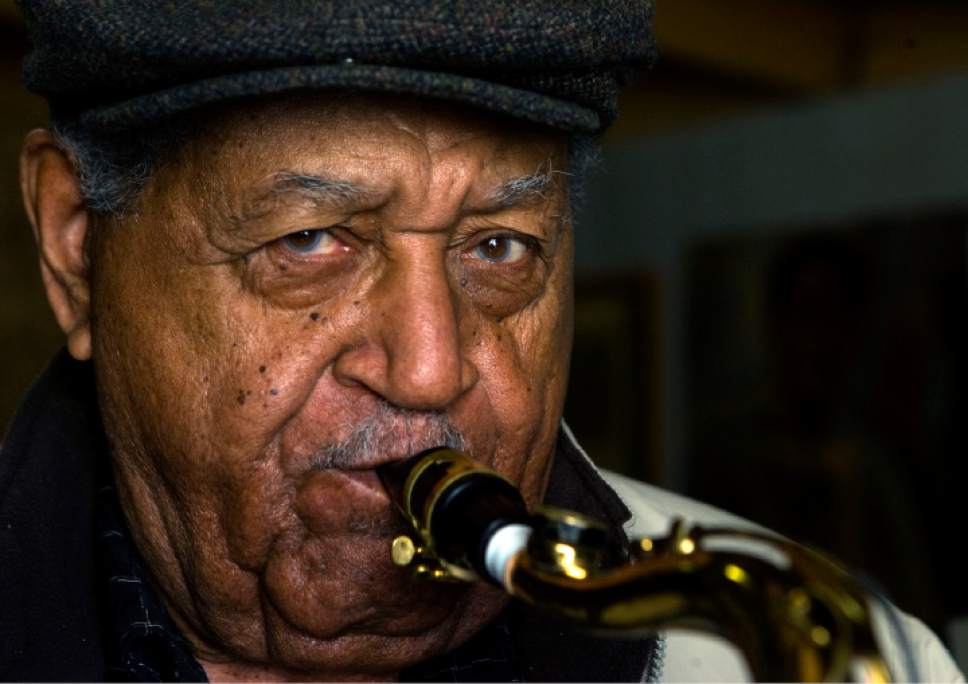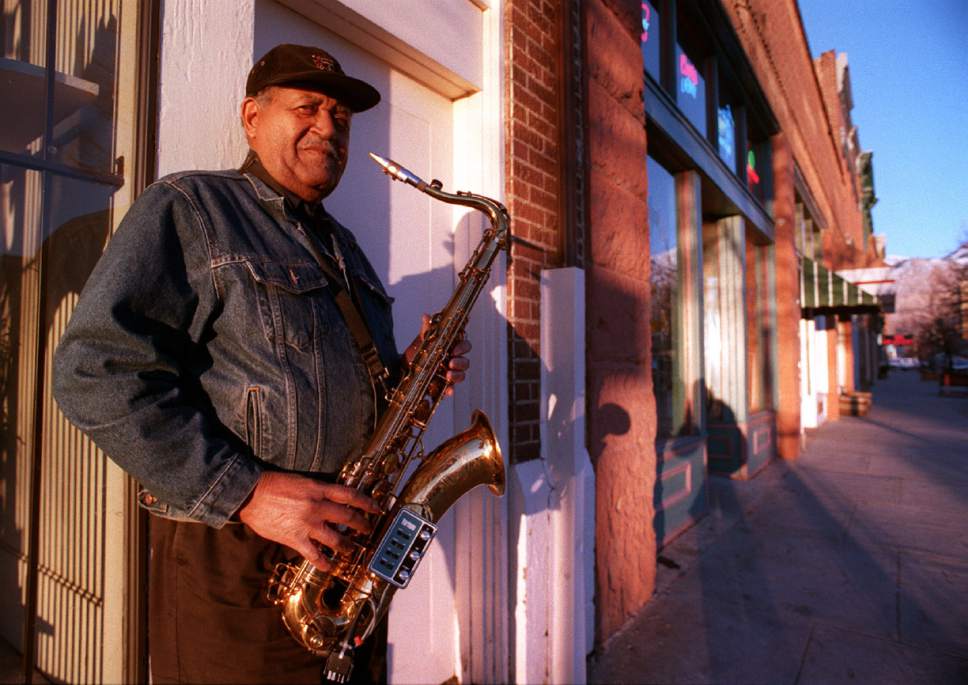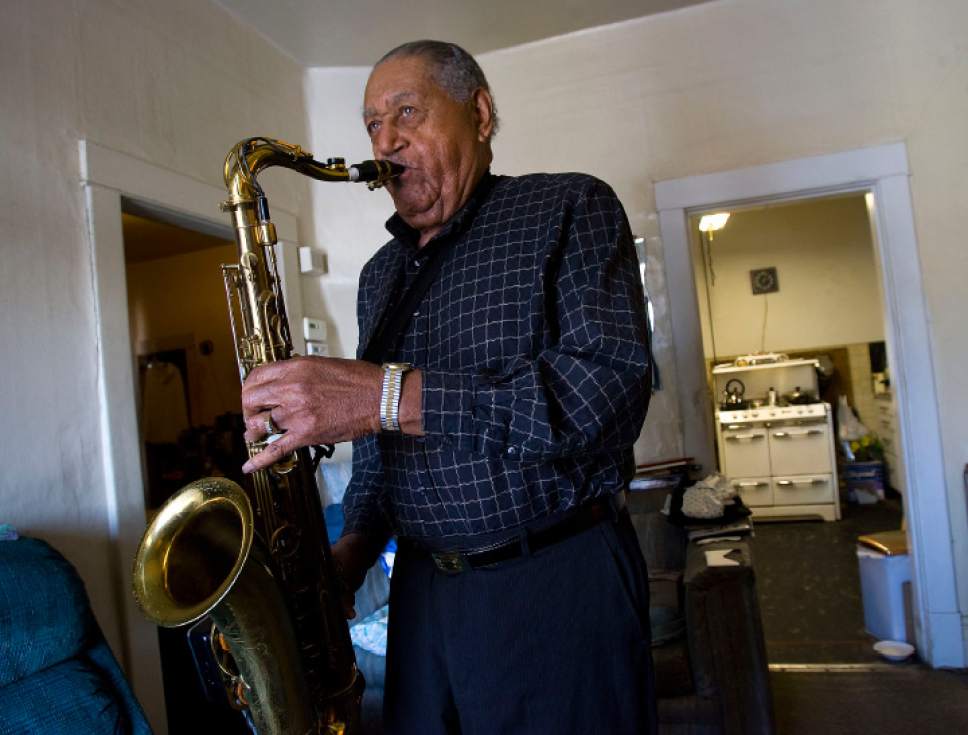This is an archived article that was published on sltrib.com in 2017, and information in the article may be outdated. It is provided only for personal research purposes and may not be reprinted.
Anyone who's met Joe McQueen knows he's got an endless supply of stories. As a jazz legend who's played with the icons of the genre and a civil-rights activist who helped integrate the clubs on Ogden's famed 25th Street, that's no surprise.
"I could talk to ya all day," he acknowledged with a chuckle.
Perhaps what is unexpected is just how much storytelling McQueen still does through his tenor saxophone at 97 years of age.
Actually, he'll be 98 in May. And yet the Joe McQueen Quartet is scheduled to play three shows in a five-day span, beginning with Thursday's Excellence in the Community concert series installment at Salt Lake City's Gallivan Center.
"Joe plays quite a lot," said Ryan Conger, the group's Hammond B3 organist and tour manager. "It's not uncommon for us to play eight times in a month."
Even McQueen's bandmates are impressed with his stamina.
"I've actually attempted to play a tenor sax, and it made me feel like I was gonna pass out," the 39-year-old Conger noted.
"It takes a lot of wind to play that tenor sax, but he gets it done," added 66-year-old drummer Don Keipp, who's played with McQueen for more than 30 years. "It's just incredible to think he's still playing at that age. I won't be!"
By all accounts, McQueen is not just playing, but playing well.
Jeff Whiteley, founder and managing director of the Excellence in the Community arts nonprofit, was succinct in his praise.
"He brings down the house," Whiteley said. "It's not pity applause."
Conger and Keipp say the horn player is at the top of his game, with the drummer noting that the almost-six-years-ago additions of almost-six-decades-younger Conger and guitarist Brad Wright to the group reinvigorated him.
"These two younger guys have given Joe a lot of energy," Keipp said. "He might be moving a little slower, but it pumps him up."
McQueen, for his part, deflects the praise but concedes his affinity for the other members of the lineup might well show through in his performances.
"I don't know about all that!" he said of the compliments. "These guys, I really enjoy playing with them. So that might have an effect."
Of course, McQueen has affected so many himself during his 71-plus years in Utah, which is all the more remarkable considering he only intended to be here a week or two.
Born in Texas, raised in Oklahoma and residing in the Bay Area at the time, McQueen was part of a big band that arrived in Ogden back on Dec. 7, 1945, contracted to play some shows in the black clubs there when the city was an unlikely jazz hotspot because it was a stop on the railroad line between San Francisco and Chicago. As the story goes, their stay became indefinitely extended when the group's bandleader gambled away the travel budget.
It's a good story, McQueen said, if not a completely accurate one, of how he and his now-92-year-old wife, Thelma, who was traveling with him, came to be permanent residents.
"Some of the people got it all wrong. They didn't understand — I could've left and gone anywhere I want. You're not stranded if you got money. And I'm not bragging, but I had enough money I could've gone anywhere. I could've gone back to California. I could've gone to Oklahoma," he said. "[Ogden] was just so different than anyplace I'd ever been. … So one thing led to another, we stayed here and we still like it."
He also settled down, in part, because he decided that "being on the road was just a pain in the ass." In the meantime, whenever jazz's heavyweights passed through — Count Basie, Duke Ellington, Nat King Cole, Louis Armstrong, Cab Calloway, Ray Charles, Lester Young — they'd inevitably find McQueen and sit in.
"So Charlie Parker comes to town, he got off the train and some guys told him a band was playing across the street from the station," McQueen recalled excitedly. "He walks into the room, and I saw who it was and I almost fell over! He came down and played with us."
As McQueen's reputation grew around town, white students would try to get into the black clubs to see him, which inevitably led to the white-only clubs hiring him — a situation that led to him influencing significant change in Utah.
"I made it known if they were going to hire my band and not let black people come in, I wouldn't be playing there," he said in a 2005 interview with The Tribune.
These days, McQueen is still impressing the musicians he plays with, even if they're admittedly biased.
"Every time I play with him, it's a lesson," Keipp said.
Conger recalled getting a chance to join because Keipp, whom he'd played with in another band, "called me up out of the blue: 'Do you want to play with Joe McQueen?' That was on my bucket list to play with Joe at some point. I jumped at the chance. I figured it'd be a one-off thing. I can't believe we're still playing almost six years later."
The organist, who just a week ago had a tendon transplanted from his right leg to his left after a skiing accident left him with a pair of torn knee ligaments, said the 97-year-old's perseverance is an enduring example.
"I think I've missed more gigs in six years due to health issues than he has," Conger said. "Just in December, he was in the hospital for over a week because he got a bad infection in a bone in his foot. When he got out of hospital, we had a gig scheduled two days later — and he was there. No health excuse is good enough. If Joe is there, you can be."
McQueen, meanwhile, doesn't want to give a false impression that he's some miracle man.
"I tell you what, it's a challenge. I have more problems than when I was younger," he said. "I have to practice a lot more. If you don't practice, you'll run out of gas. … You can't just get up here and do it."
That said, he's not planning to stop doing something he's done since he was 14 just because he's old.
"Well, I love it that much. … I don't really know what I would do if I had to quit," he said. "I don't have any other hobbies conducive to me doing anything else."
Conger implored music fans to capitalize on that passion while the opportunity is still available, to listen to one more story before they stop.
"Get out and see Joe while you can," he said. "You never know when the last show is gonna be."
Twitter: @esotericwalden —
Joe McQueen Quartet shows
Thursday • At Gallivan Center (indoors in Gallivan Hall at the north end of the plaza), Salt Lake City, 7:30 p.m.
Friday • At Lighthouse Lounge, Ogden, 8 p.m.
April 3 • At Peery's Egyptian Theater, Ogden, 7 p.m.
—
Other Excellence in the Community concerts
All events are free and no tickets are required. For more information, visit excellenceconcerts.org.
April 3 • Strawberry Fields — The Songs of Lennon & McCartney, at Covey Center, Provo
April 6 • George Brown Quintet, at Gallivan Center, Salt Lake City
April 8 • Kate MacLeod, at Viridian Center, West Jordan
April 13 • Synthesis Big Band, at Gallivan Center, Salt Lake City
April 20 • Tango West, at Gallivan Center, Salt Lake City
April 27 • Jon Gudmunson — Gerry Mulligan Tribute, at Gallivan Center, Salt Lake City







